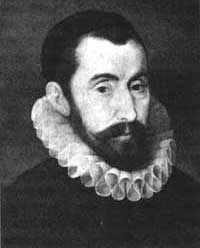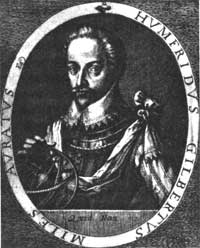|
FORT RALEIGH National Historic Site |
 |
 Sir Francis Walsingham. Courtesy National Portrait Gallery. London. |
 Sir Humphrey Gilbert. |
Gilbert and Raleigh
The statesmen, merchants, and ship captains of Elizabethan England shared the adventurous and speculative spirit of the Spaniards and Portuguese who had established empires in the West after 1492. Religious zeal and both personal and national interests impelled Englishmen to compete with Spain and Portugal for a share in the exploration and development of the New World. Englishmen wondered if they could not find a northwest passage through the American continent which would divert the wealth of the Indies to England, or if they could not translate the mineral and agricultural wealth of North America into English fortunes as Spaniards had grown rich from the gold of Mexico and Peru.
On June 11, 1578, Sir Humphrey Gilbert obtained from Queen Elizabeth a charter to discover and colonize "remote heathen and barbarous lands" not actually possessed by any Christian prince. In 1583, he ventured almost his entire fortune, as well as that of his wife, Anne Aucher, in an attempt to explore the northern part of North America and found a colony in the New World. The Queen herself displayed interest in the enterprise by giving Raleigh a good-luck token to send to Gilbert just before the expedition sailed. Gilbert landed at St. John's, Newfoundland, which he claimed for England, but on coasting southward he met with repeated misfortunes, turned away, and was himself drowned on the return voyage to England. He had insisted on sailing in one of his smaller ships. "I will not forsake my little company going homeward, with whom I have passed so many stormes and perils." Among his last recorded words was the famous cry to his men in the larger boat, "We are as neere to heaven by sea as by land." His last will and testament, dated July 8, 1582, makes clear that his ultimate purpose had been to found an English empire beyond the seas to be colonized by English people.
Gilbert's heroic death must have deeply moved his half-brother, Sir Walter Raleigh. The latter had voyaged with Sir Humphrey Gilbert in an expedition of 1578 and had fitted out a ship intended to participate in the great voyage of 1583 to Newfoundland. In 1584, when the Gilbert patent was to expire, Raleigh stood high in the favor of the Queen and received from her a charter which confirmed to him the powers formerly enjoyed by Sir Humphrey Gilbert.

|
|
Last Modified: Mon, Dec 2 2002 10:00:00 am PDT |


